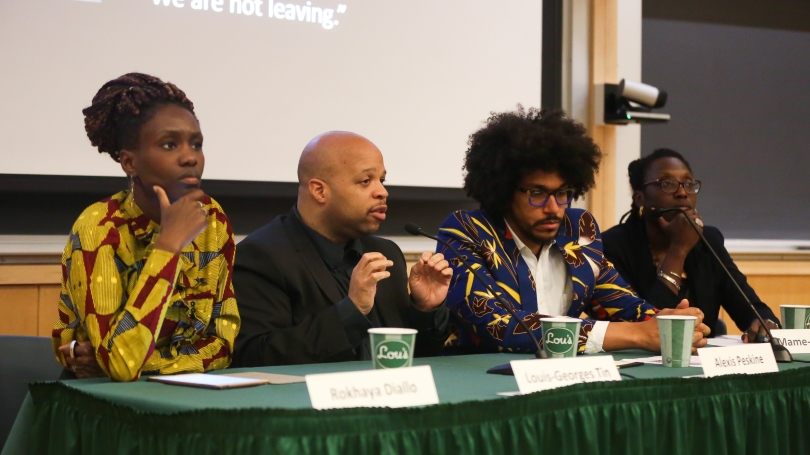
- Public Policy
- Leadership
- Funding
- News & Events
- About the Center
Back to Top Nav
Back to Top Nav
Back to Top Nav
Back to Top Nav
On April 27 and 28, 2018, numerous accomplished and inspiring scholars and artists traveled to Hanover, NH to participate in the Afro/Black Paris Symposium. This Conference was convened by Professor Keaton of Dartmouth’s Africa and African American Studies department with support from numerous other departments from all around campus, including the Rockefeller Center.
The Symposium was open to both students and community members and provided foundational knowledge about people of African descent in Paris as a lead up to this summer’s inaugural Foreign Study Program entitled, Afro/Black Paris: The African Diaspora and the City of Light, in Paris, France. A film series exploring the African diaspora also accompanied the Symposium.
The Symposium was structured as a series of panels followed by question and answer sessions. The three panels entitled, Framing Afro/Black Paris: Past-Future & Future-Past; France, Slavery, and Colonialism; and Afro/Black Paris: Imaging Activism and the Visual Landscape, each focused on a different aspect of the history and experience of people of African descent in France.
A plethora of scholars spoke on topics ranging from the impacts of Eurocentric beauty standards to the use of art exploring the black experience. Professor Bennetta Jules-Rosette, a Professor of Sociology and the Director of the African and African-American Studies Research Center at the University of California, San Diego, discussed her research on Josephine Baker. Baker was an African-American expatriate who fled to France to escape racism. Professor Jules-Rosette noted that Baker had a “futuristic” idea of Black Paris that informed Baker’s interaction with her adopted country and the United States. This understanding led Baker to adopt children from all over the world—a family she called the Rainbow Tribe.
Similarly compelling, Tyler Stovall, Professor of History at the University of California, Santa Cruz, approached Afro/Black Paris from a historical perspective. Professor Stovall discussed the “fight for an inclusive past” and the implications of the black experience largely being erased from the hegemonic historical narrative. He posed the questions, how does the history of Black Paris fit into existing categories of history and how does this conceptualization of the past inform our present? The Symposium dealt with these questions for the remainder of the discussions.
Louis-Georges Tin, Associate Professor at the University of Orléans, tied the past, present and future together through his discussion of reparations. He stated that slaves simply wanted two things: freedom and justice. While freedom from the bonds of slavery was achieved, justice remains elusive. He asserted that reparations equals justice. Refusing reparations is to refuse justice and to deny the realities of the crimes of slavery. Through this dialogue, the panelists and conference attendees engaged in a passionate academic discussion about the definitions and implications of blackness.
Witnessing and being a part of this conversation was an impactful experience. Not only did Symposium attendees learn about blackness in a global context, but they also were able to engage with a community of inspiring scholars.
-Written by Alexandrea Keith ’20 Rockefeller Center Student Program Assistant for Communications